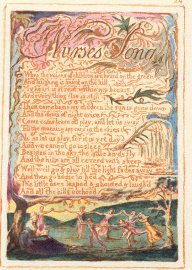Songs of Innocence and Experience Contents
Nurse's Song (I) - Synopsis and commentary
Synopsis of Nurse's Song (I)

A group of children play outside on the hills, while their nurse (carer) listens to them in contentment. The first stanza gives the nurse's thoughts, the following three the dialogue between her and the children. As twilight begins to fall, she gently bids them to ‘leave off play' and go home for the night. They ask to play on as long as the light lasts, because the birds and the sheep are not yet at rest. The Nurse yields to their pleas. The children shout and laugh with joy and the hills echo their gladness.
The poem reflects a pastoral context, demonstrating harmony between nature and human beings, including between young and old. It also returns to the theme of the nature of authority and leadership. The Nurse's care does not repress or direct the children but allows them freedom to play.
Commentary
This poem echoes the setting of The Ecchoing Green, but is seen from an adult perspective rather than a child's. At the start of her song, the Nurse takes pleasure in watching her charges play. Their happiness inspires in her a feeling of contentment and tranquillity. Aware of the onset of the dangers of night time, there is a note of anxiety in her repeated call to the children in the second stanza. However, either readily or with resignation, she indulges their desire to prolong their play.
The exercise of authority
The Nurse is a guardian presence who stands apart from the children but supports rather than dominates them. There is no trace of authoritarian desire to suppress and control, or envy of the children's freedom, even though they are pushing at the boundaries of her authority. Her delight is in their play. This quiet contentment contrasts with the children's energy, but the difference does not constitute an opposition.
This nurse is like the shepherd in the poem of that name. Like him, her care is shown by letting the children be, and they are her source of delight and praise. She is nurse and not mother, so her love and care for the children is not affected by any notion of possession coming from a mother-child relationship.
Natural harmony
There is a also sense of unity between human beings and the natural world:
- The Nurse's initial tranquillity is at one with the evening's natural stillness. Both seem to envelop the carefree children in a tender protection
- The children see themselves as part of nature. They cannot bear the thought of abandoning their play if birds and sheep are still awake. The children share their innocence and unselfconscious spontaneity.
Time
The children, like the animals, are conscious only of the present. They are unaware of time and, therefore, of mortality. Innocence is (again) potentially vulnerable.
Investigating Nurse's Song (I)
- Compare the nurse in this poem with the old people in The Ecchoing Green
- What do they have in common?
Recently Viewed
Related material
Scan and go

Scan on your mobile for direct link.